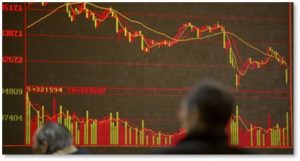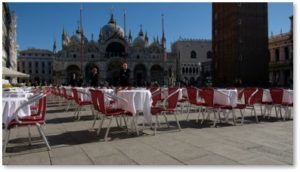The World Health Organization has labeled the novel coronavirus as a global pandemic. I think the label is a formality—we knew it already. Besides, reaching pandemic status was inevitable given how quickly and how widely the virus has spread.
Coronavirus: Immediate Consequences
Watching the consequences of Covid-19, with its rapid spread and ability infect people with ease, amazes me. The larger question is whether it will change some processes and structures for good on alter them only temporarily. Right now, it’s having an economic impact on individuals as the world responds.
 The industries being heavily hit include:
The industries being heavily hit include:
- Travel (airlines, cruise lines, bus lines)
- Cruise lines (ocean and river)
- Hospitality (hotels, restaurants, bars)
- Vacation destinations (Disney parks, theme parks)
- Entertainment (movie theaters, legitimate theater, ballet, opera, concerts, sports events)
- Manufacturing (supply chain, just-in-time delivery)
- Meeting venues (conference and convention centers, trade show halls, hotel ballrooms)
The stock market has also felt the pinch, having $3.6 trillion in value erased in one week. It goes up and down like a rubber ball depending on the latest news.
Tip of the Economic Iceberg
Remember, however, that this is the tip of the iceberg. The trickle-down effect happens almost immediately. When business evaporates, employees get furloughed or laid off. The lucky ones receive their pay anyway; the unlucky ones see their paychecks disappear.
Businesses take a hit to the bottom line when they can’t produce their goods due to lack of raw materials or an inability to get goods assembled, or assembled products shipped back. Factories shut down, which is good for preventing the spread of disease but not so good for the employees who lose money.
 Big companies can take the hit short-term and survive. Small businesses like restaurants, bed and breakfasts, and mom-and-pop shops cannot. Independent contractors such as bus drivers, performers, ride-share drivers, and tour guides watch their revenue fall off a cliff.
Big companies can take the hit short-term and survive. Small businesses like restaurants, bed and breakfasts, and mom-and-pop shops cannot. Independent contractors such as bus drivers, performers, ride-share drivers, and tour guides watch their revenue fall off a cliff.
Looking Beyond the Obvious
Many people have no actual visibility to those who have been affected economically. While the press obsesses over personal things like hand washing and elbow bumps, others worry about how they are going to pay the bills. For example, when GSA canceled Mobile World Congress—the world’s largest telecommunications show—last month, it meant that 100,000 visitors did not come to Barcelona in 2020.
Some of those people came to the city every year to staff and run the show. Others visited the show to see the exhibits, hear the speakers, and learn about the latest developments.
 Abruptly, all of that stopped. Those visitors spent $513 million during last year’s Mobile World Congress. When the show was canceled, Barcelona lost out on half a billion dollars — a big contribution to their economy.
Abruptly, all of that stopped. Those visitors spent $513 million during last year’s Mobile World Congress. When the show was canceled, Barcelona lost out on half a billion dollars — a big contribution to their economy.
More than 430 hotels in the city went from fully booked to empty overnight. The 14,000 jobs created each year by MWC evaporated. Some 15,000 temporary taxi drivers got the word to stay home. And that trickle-down process included the people who do shipping and drayage—getting exhibits to the convention center and onto the show floor. It also affected the Install and Dismantle companies that put up the big exhibits and take them down again. The employees at the two MWC venues, working in the cafes, cleaning the bathrooms, polishing the floors, vacuuming the carpets, maintaining security, and performing other back-of-the-house functions most visitors never see, lost out as well.
Personal Impact of the Coronavirus
Although my family is all healthy, my husband and I canceled the Viking River Cruise we had planned for next month and will reschedule it for another time. Thanks to our expert AAA travel agent and Viking’s superb customer service, we will lose very little money because of this decision. It will, however, open up a stateroom, cancel tours, leave airline seats empty, etc.
 I am, however, a tour guide in Boston and I was looking forward to a robust tourist season, starting this month.
I am, however, a tour guide in Boston and I was looking forward to a robust tourist season, starting this month.
Right now, though, I’m watching the school tours scheduled for April vacation week being cancelled one by one. The cruise ship tours don’t usually ramp up until May, so there’s still time for the pandemic to dwindle, as it is doing in China.
But I’m not holding my breath. TV images of quarantined cruise ships and ships that can’t dock because the ports are closed have done the industry a great deal of damage. Their image and public relations have suffered.
Consequences: Permanent or Temporary?
Avoiding large groups is good hygiene in a situation like this. Canceling Mobile World Congress caused controversy at the time, but hindsight tells us it was the right thing to do. Boston has canceled the annual St. Patrick’s Day parade. The Boston Convention Center has lost the Seafood Expo, an oncology conference, a journalism symposium, and a conference on cognitive neuroscience.
It remains to be seen whether — dare I say it — the Boston Marathon will go off as scheduled or any fans will fill Fenway Park to cheer the Red Sox on opening day.
The Impact Trickles Down
 Just remember, that the impact of this pandemic goes beyond those affected by the coronavirus.
Just remember, that the impact of this pandemic goes beyond those affected by the coronavirus.
- Will trade shows and conferences survive as business tools or morph into online events?
- Can small businesses get through this without closing their doors?
- Should independent contractors find an alternate way of making money or just hunker down and wait it out?
- Will colleges and universities turn to online courses permanently?
- Should people stay off cruise ships indefinitely or take advantage of the bargain rates that are sure to be offered?
Waiting for Answers
We have no answers—yet. Those will only reveal themselves over time. First, we all must cooperate to get through the massive global disruption caused by the coronavirus. We’re all in this together on Planet Earth so we need to be careful and considerate of one another.
Stay home, stay safe, and stay healthy. I hope most people come out the other side in one piece.

“Most people?”
I am not nearly as concerned about the actual virus as I am about:
1. The sheer panic as desperate people start scuffling – and possibly worse – over stocks of items that aren’t getting refilled fast enough. I do not feel like a gunfight at 20 paces for the last package of paper towels or bag of rice.
2. The overwhelming of the health care system from the “pulse” of people needing care. Thus, “social distancing” is a necessity to slow down the spread – and realistically, it’s unstoppable in toto – to lower the at-the-moment health care system demand.
3. IMHO the single biggest danger is that 95% of antibiotics, let alone many other medications, are dependent on production in China… which is now threatening using that near-monopoly as leverage.
Antibiotics work on bacteria, David, not on viruses. They are useless for curing viruses. Also, you have a word missing on #2. The overwhelming what?
Antibiotics work on the secondary infections, like pneumonia, that can happen to people with respiratory problems. For example, my son has had four pneumonias in his life so far, two requiring hospitalizations… the progression is plain. Colds triggers his asthma, and without jumping on that very hard and early, pneumonia lands, likes where it’s landed, and blooms. Requiring antibiotics.
The overwhelming of the heath care system. If the per-day flow of people is too much for the health care system – whether people or equipment – triage decisions will be made like they are in Italy now. We only have so many beds, we only have so many people trained (and those don’t appear overnight) – and if they, themselves, catch it that’s fewer people available to help.
Stay inside and stay healthy.
From the vantage point of my secure little condo, and the proceeds of my house sale tucked safely in the bank, my heart is truly heavy with thoughts of those whose food, rent, medical bills all of a sudden are in such jeopardy. I truly hope that there will be a well thought out and effective government response to mitigate the great insecurity that so many people will be facing.